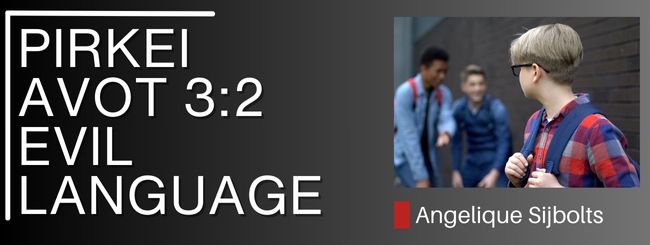בס”ד
רַבִּי חֲנִינָא סְגַן הַכֹּהֲנִים אוֹמֵר, הֱוֵי מִתְפַּלֵּל בִּשְׁלוֹמָהּ שֶׁל מַלְכוּת, שֶׁאִלְמָלֵא מוֹרָאָהּ, אִישׁ אֶת רֵעֵהוּ חַיִּים בְּלָעוֹ. רַבִּי חֲנִינָא בֶן תְּרַדְיוֹן אוֹמֵר, שְׁנַיִם שֶׁיּוֹשְׁבִין וְאֵין בֵּינֵיהֶן דִּבְרֵי תוֹרָה, הֲרֵי זֶה מוֹשַׁב לֵצִים, שֶׁנֶּאֱמַר (תהלים א) וּבְמוֹשַׁב לֵצִים לֹא יָשָׁב. אֲבָל שְׁנַיִם שֶׁיּוֹשְׁבִין וְיֵשׁ בֵּינֵיהֶם דִּבְרֵי תוֹרָה, שְׁכִינָה שְׁרוּיָה בֵינֵיהֶם, שֶׁנֶּאֱמַר (מלאכי ג)
Rabbi Hanina, the vice-high priest said: pray for the welfare of the government, for were it not for the fear it inspires, every man would swallow his neighbor alive.
R. Hananiah ben Teradion said: if two sit together and there are no words of Torah [spoken] between them, then this is a session of scorners, as it is said: “nor sat he in the seat of the scornful…[rather, the teaching of the Lord is his delight]” (Psalms 1:1); but if two sit together and there are words of Torah [spoken] between them, then the Shekhinah abides among them, as it is said: “then they that feared the L-rd spoke one with another; and the L-rd hearkened and heard, and a book of remembrance was written before Him, for them that feared the L-rd and that thought upon His name” (Malachi 3:16)…
One of the Noahide Commandments is to establish a legal system. One approach to ensure the 7 Noahide Commandments is for the government to maintain a functional justice system. People should be humble and watch out for the interests of their loved ones, but in practice, this is not always the case.. As Bartenura[1] writes:
“would swallow alive:” As it is written (Habakkuk 1:14) “And you make man like the fish of the sea” – just like the fish of the sea, each one that is bigger than his fellow swallows his fellow; so too people, were it not for the fear of the government, each one who is bigger than his fellow would swallow his fellow (Avodah Zarah 4a).
We should tell them about the 7 Noahide Commandments and how to improve their attributes wherever we can. If we knew they would listen to our message and abandon their old ways. We are not required to say these remarks to the other person if we know they will be ignored.
In all of our talks, we should be mindful of what we say. Conversations frequently devolve into gossip, slander (Hebrew Lashon hara – Evil Language), or discussions on inappropriate themes. We are frequently ignorant of the enormous impact that words have on 1) the person about whom we are speaking, 2) ourselves, and 3) the person listening to us.
1) We’re talking about the influence on our fellow humans. We’ve all heard of folks who have been victimized by rumor or slander from others. This can result in anxiety, despair, or worse. When someone’s face turns white, it’s as if they’ve done murder:
The Tora says, “Do not embarrass someone in public. The word used for embarrassment is lehalbin panim, or “to make the face go white” because when someone is embarrassed, the color drains from their face[2].
Or if someone’s face turns red due to embarrassment, as Rabbi Elazar said:
One who causes his fellow’s face to blush in public: a well-known aggadah teaches that one who causes his fellow to be embarrassed, it is as if he had killed him. The rush of blood to his face is similar to bloodshed.
2) It has major implications for the person who speaks Evil Language. Consider, for example, Miriam who was punished with Tzara’at[3] and had to spend 7 days outside the camp. But think also, for example, of Joseph. The Chafetz Chaim explains that his brothers’ speaking Evil Language towards his father was one of the reasons why he had to descend as a slave to Egypt.
Evil Language can lead to punishment in our lives today. But can also lead to punishment in Heaven’s court. As the Chafetz Chaim teaches:
Every word spoken turns into an angel. Good words into good angels, bad words into angels who will be our adversaries during our trial in Heaven.
3) It also has major consequences for the person listening to it. Interestingly, this is the person who is most guilty, even though he/she is ostensibly the innocent one. All he/she did was listen! But the Talmud says that listening to bad speech is even worse than speaking it; the person had the power to stop it and did not.[4]
Rabbi Hillel said:
“That which is hateful to you, do not do to your fellow. That is the whole Torah; the rest is the explanation; go and learn.”
—Talmud, Shabbat 31a
Find the good in yourself and find the good in others. Then you wont commit this grievous offense.
We are required to inform a person of another’s conspiracy against him. We are also required to share information with anyone who can assist the offender. For example, you should definitely notify parents if their youngster is hanging out with the wrong crowd[5].[5].
By Angelique Sijbolts
Sources:
[1] Bartenura on Pirkei Avot 3:2:2
[2] Chabad Article: Gossip and Slander
[3] Chabad Article for information about what Tzara’at is: Is Tzara’at Leprosy?
[4] Aish Article: Stopping Lashon Hara
[5] Chabad Article: Gossip and Slander
Chafetz Chaim Sefer Shemirat Halashon
© Copyright, all rights reserved. If you enjoyed this article, we encourage you to distribute it further.
